Eating without rules, restrictions, guilt or shame, relying solely on the relationship you have built with your body – sounds ideal, right? To some, this concept may feel radical and impossible – going against everything we have been taught and learnt surrounding dieting.
When most people hear about intuitive eating, they are confused – is this a thing? People can do this? Food to some was calculative, and the idea of listening to your own body scares many. Fear about overeating, or losing control often present, as diet culture had seeped its way into every aspect of my relationship with food.
At Imbodi Health we work as Intuitive Eating Dietitians and practise a non-diet approach to eating. It’s not a diet, it’s not a prescribed meal plan – it is a framework, requiring us to listen and honour the cues our bodies present.
Can Intuitive Eating Help With Weight Loss?
What Is Intuitive Eating?
Where Did Intuitive Eating Come From?
What Are The 10 Principles Of Intuitive Eating?
Does Intuitive Eating Actually Work?
Will I Gain Weight When I Start Intuitive Eating?
Signs You May Be Ready To Start Intuitive Eating
How Do I Get Started With Intuitive Eating?
Signs That It Might Not Be Right For You
Who Can Help Me With IE?
What To Expect When You Start Eating Intuitively
Can Intuitive Eating Help With Weight Loss?
In its very essence, intuitive eating (IE) seeks to reconnect the relationship between body and self. It involves the abandonment of labelling foods ‘good’ and ‘bad’, encouraging the individual to learn to trust their own hunger and fullness cues.
It relies on the biological cues believed to be innate to our human nature, trusting us to eat at our own free will, rather than reliance on rules or instructions imposed by whatever diet is circulating at any given moment.
In a world riddled with diet culture, IE is a powerful way to reclaim the narrative of individual nutrition. It does this by throwing away the calculative approach – no calories, macronutrient goals, meal plans or specific diet labelling, and even challenging the idea of eating at set times.
It’s underlying goal and intention, is not designed for the goal of weight loss.
What Is Intuitive Eating?
This approach is simple in theory – eating when hungry, and stopping when full.
Intuitive eating is complex, but overall it is not:
- A strict diet
- A way to lose weight
- A method to label foods ‘good’ and ‘bad’
- A justification to restrict
It encourages us, as humans, to strip down our relationship with food. This involves subverting the narrative pushed upon us by diet culture.
Our desire to eat is prompted by more than just physical hunger – we are driven to eat socially, emotionally, for comfort, boredom, enjoyment, even smelling or seeing food. Eating intuitively involves identification of these hunger signals, and our response to them.
A concept so simple in theory, can be easily overcomplicated.
This approach isn’t going to be suitable for everyone – for those who struggle to identify their bodies hunger and fullness cues, this may lead to eating too little. In eating disorder recovery, it isn’t always ideal to rely on your intuitive hunger and fullness cues – as eating disorder behaviours often result in a lowered appetite, and disconnection between the body and self.
Judgement about whether this approach is appropriate for you can be done through educating yourself, talking to others and even seeking professional help. Ultimately, it has to come from you and your understanding of yourself.
Where Did Intuitive Eating Come From?
The concept of eating with intuition is not new, and was developed by two registered dietitians in California – Evelyn Tribole and Elyse Resch. The book ‘Intuitive Dietiting; A Revolutionary Program that works’ was published in 1995 (1).
This came in response to the failing of conventional diet programs in America. Despite levels of dieting, particularly low-fat diets, it was failing, and diet culture had society globally trapped in a continuous, failing cycle.
It was found that dieting was leading to eating disorders and an unhealthy relationship with food and movement (2). They called this the ‘diet backlash’.
This approach was perceived as revolutionary and radical at the time – despite being so simple in its essence, it rejected every principle and diet mentality that had been ingrained. In a world consumed with ‘good’ and ‘bad’ food rules, this approach adopted a ‘non-diet’ lens. This meant the focus of eating shifted from external, diet culture influence, to reliance on biological and psychological cues.
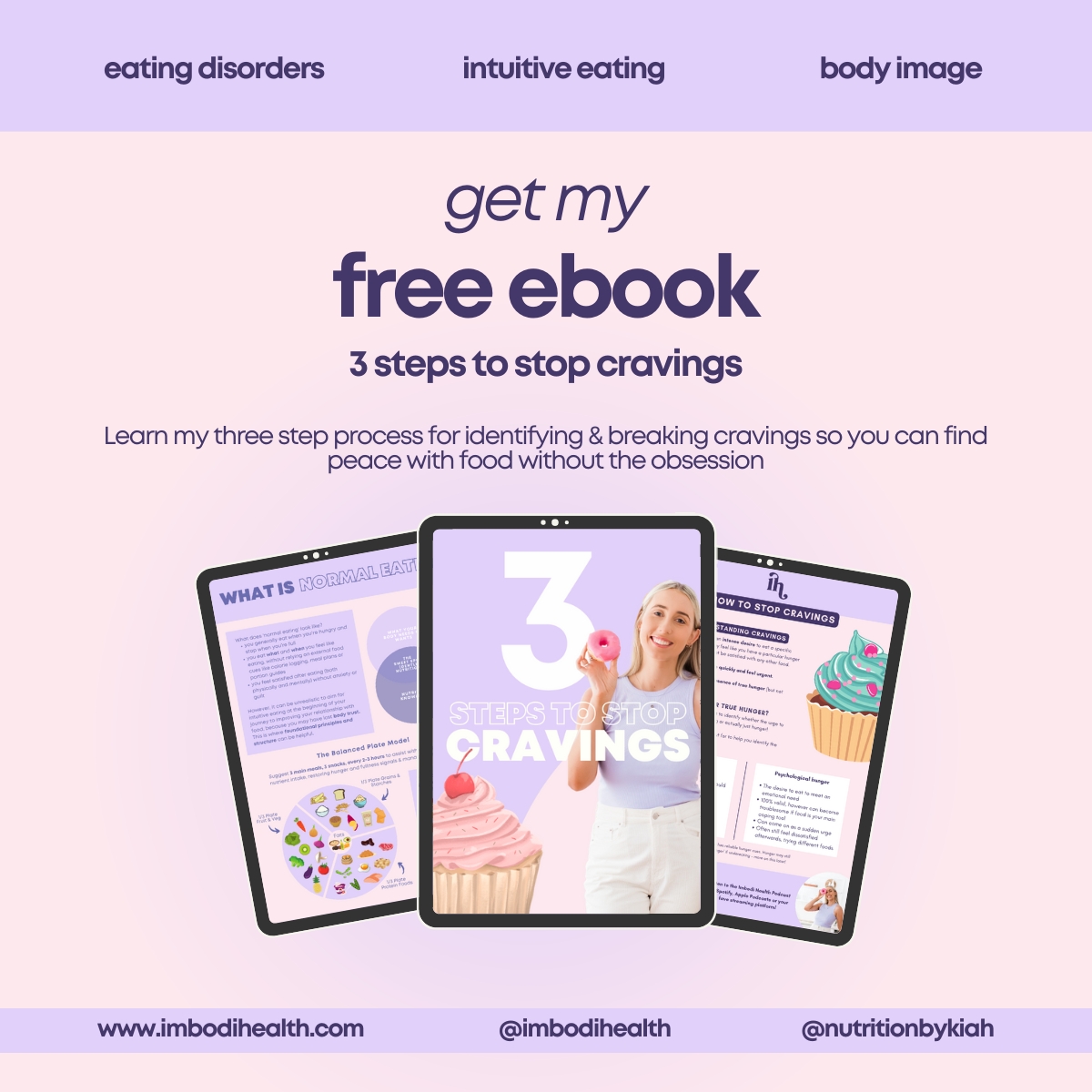
Get your copy of my free 3 Steps To Stop Cravings eBook here!
What Are The 10 Principles Of Intuitive Eating?
The pair built this framework through establishing the 10 principles of intuitive eating (3) which provided the outline of the concept.
Essentially, it urges us to begin mending our relationship with food and nutrition.
This involves abandonment of diet culture, or self derived rules regarding our intake.
The ten principles are:
- Reject the diet mentality
- Honour your hunger
- Make peace with food
- Challenge the food police
- Discover the satisfaction factor
- Feel your fullness
- Cope with your emotions with kindness
- Respect your body
- Movement – feel the difference
- Honour your health – gentle nutrition
Rather than encouraging the common paleo, keto, low-carb, low-fat diet, Tribole and Resch urged people to make peace with food – and to give yourself ‘unconditional permission to eat’ (4).
The 10 principles go beyond just food – they include the importance of movement, and to reject ‘militant’ exercise, and to ‘shift your focus to how it feels to move your body, rather than the calorie-burning effect of exercise’ (5).
In a world fuelled by compensatory exercise, this encouraged a movement of connection to self, body and mind.
Does Intuitive Eating Actually Work?
Eating intuitively has proven physical, emotional and psychological benefits.
Comparatively to restrictive dieting, those following an intuitive approach are shown to consume a wider variety of foods, which is inherently beneficial as it provides a variety of nutrients (6).
A 2010-2018 study found that IE is ‘a valuable intervention target for improving psychological health and reducing disordered eating behaviours, particularly binge eating’ (7).
Will I Gain Weight When I Start Intuitive Eating?
Something commonly holding people back from intuitive eating is the fear of losing control, or gaining weight.
Diet culture has heavily manipulated our relationship with body, mind and self, that we perceive weight gain to be the most negative consequence of healing your relationship with food.
Regardless, 25 studies have shown that those who practise IE generally weigh less than those following restrictive diets (8). The point of IE is not to lose weight, but sometimes comes as a result.
If you gain weight when you finally start to eat enough, and move your body with kindness, this is weight you needed to gain.
Your body will adjust and find its happy place, after regularly nourishing your body. This may take time, but trust your body. It knows you better than diet culture does! For many, IE leads to weight stability (9) after this initial process.
As a society, we are taught that weight gain is the worst possible outcome of eating. IE allows you to challenge this narrative, and teach you that mending this relationship will matter more than the shape of your body.
Signs You May Be Ready To Start Intuitive Eating
So, benefits proven, and preconceptions challenged – where to from here?
It’s up to you, to truly know and recognise if you are ready, and in a position to begin learning and listening to your body.
As humans, we are inherently unique and individual – what works for one may not work for you. This is applicable to IE, and the approach may not work for all.
But, for many – it can be life changing. It can challenge every disordered thought process you have surrounding food and nutrition.
Signs That You’re Ready:
- Tired of the yo-yo dieting, constantly bouncing from one fad diet to another
- Your relationship with food is calculative and disordered
- You view exercise as a form of compensation
- Have a tendency to feel guilty after eating, especially after eating what you perceive to be too much
- You binge eat, or eat in secret
- Feel like you can’t trust your body’s own hunger and fullness cues
- Find yourself constantly comparing your food and body to others
- You spend a lot of time reading, watching and thinking about food and what you are going to eat next
And overall, believe and know that these factors are producing unsustainable results.
To begin IE, you must acknowledge that your current food and exercise regime is not working for you. Acknowledge that you need to reclaim the narrative diet culture has pushed upon you, and that you need to take action to mend your relationship with food.
You must be ready and willing to challenge the rules that may feel so intrinsic to your selfhood and your daily life.
You must be ready to change.
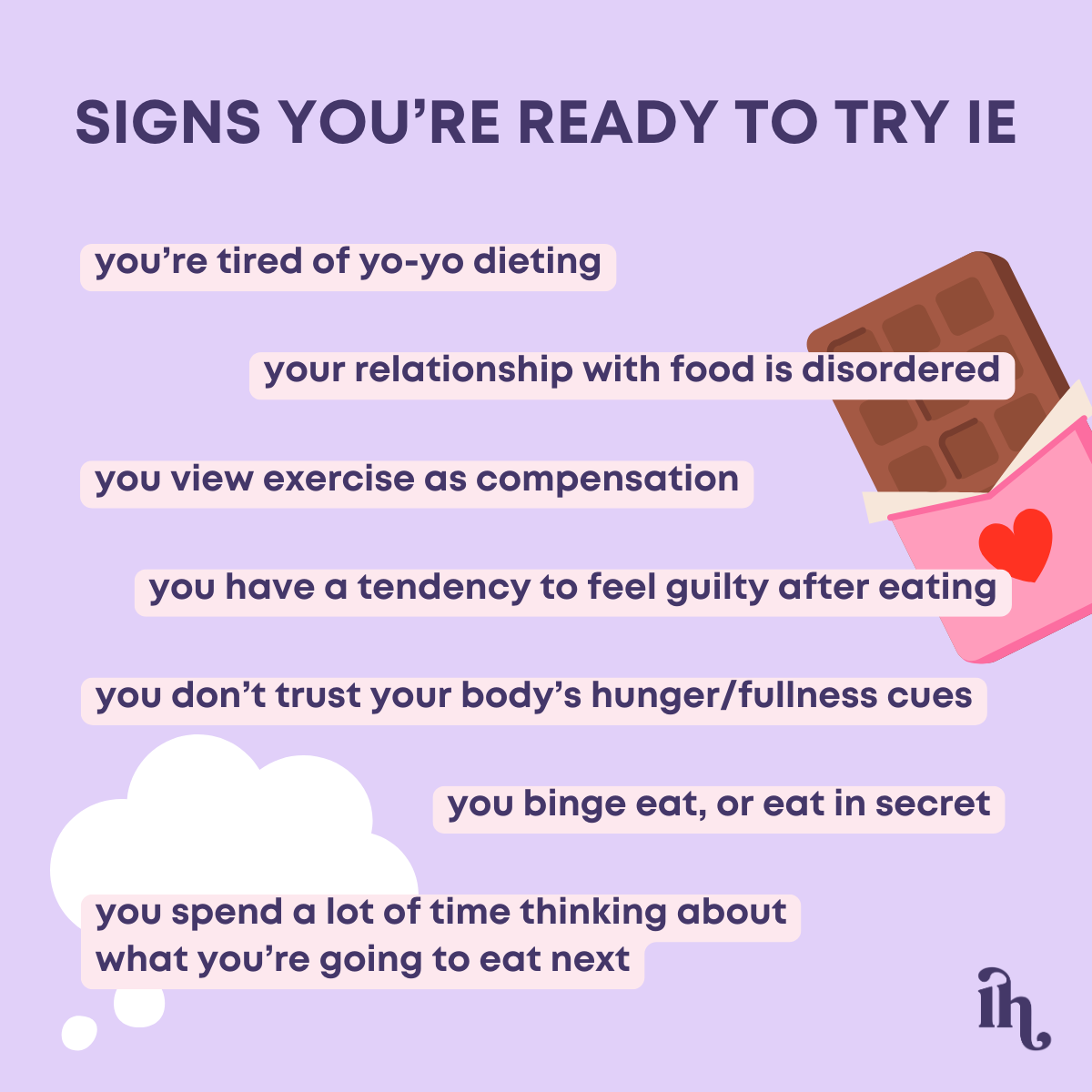
How Do I Get Started With Intuitive Eating?
It can be really helpful to educate yourself. Reading the book ‘Intuitive Dieting; A Revolutionary Program that works’ (10), to help you better understand what steps you need to take and why.
Writing a list of intentions, outlining your motivating factors and overall goals.
If you are entering this from a place of prolonged restriction/disordered eating, it would be very beneficial to see an intuitive eating dietitian, one who can guide you through the principles and provide education to the framework.
Imbodi Health offers the Nourishing Mind and Body Program, an individual or group program underpinned by IE. This is designed to help you break free from yo-yo dieting and unrealistic food rules and learn how to nourish your body (without the obsession) (11).
Signs That It Might Not Be Right For You
A range of conditions may prevent the approach being suitable for you.
People with chronic disease may need to work with an intuitive eating dietitian to find an approach that works for them.
Even financial/situational restrictions may inhibit your ability to engage with the framework in its entirety.
It’s especially important for those with eating disorders to consult a medical team prior to implementing IE. Following IE principles is dependent on where you are in your journey, as IE is often a focus on the latter end of recovery, depending on the person.
Who Can Help Me With IE?
We are conditioned to live in a world where food and exercise is so deeply overcomplicated.
Entering the journey of IE may be daunting, it may be challenging to imagine a reality where you are able to finally learn to make peace with your body.
Despite feeling ready to start your journey, it is always beneficial to have trained and knowledgeable professionals ready to support you.
There are many educated, passionate intuitive eating coaches, who are able to guide you in your journey with IE.
Dietitians at Imbodi are IE, affirming, practising a method of treatment which seeks to empower the individual to mend their relationship with food and self.
They approach this from a ‘non diet’ perspective, passionate about helping you develop a better relationship with food and make peace with your body, so you can enjoy life to the fullest (11). This can be done through individual, 1:1 treatment, or group consults, where you are supported by others on the same journey.
What Does A Day Of Intuitive Eating Look Like?
I can’t provide a ‘full day of eating’ for intuitive eating. This is because it isn’t prescription, calculative or uniform – each and every day looks different, for everyone.
This might look like spontaneous ice cream after dinner one night, and pancakes for breakfast another. And through this, each step is to be taken without guilt, without shame, without self judgement and criticism.
What To Expect When You Start Eating Intuitively
IE involves going against every narrative that has been forced on you. It may feel radical, overwhelming, confronting – learning to trust your body when it has been programmed to engage with these rules and routines.
Fully committing to the IE journey may feel amazing for some, and painful for another. Depending on your relationship and history with food.
Expect to feel challenged. Expect to take the process gradually, and with kindness to yourself.
Ultimately – reconnection.
As children, we are born with the natural ability to eat intuitively. We eat when we are hungry, we stop when we are full.
IE allows you to reconnect with your younger self.
The self before diet culture latched upon your life.
Beyond reconnection with yourself, it also allows you to reconnect with others. Food is central to the human experience.
You may have spent years turning down plans with friends, skipping the birthday cake, insisting on eating at places with options you deemed ‘safe’ and ‘healthy’.
The principles of IE allow for you to change this. To stop turning down plans, withholding yourself from experiences and opportunities that diet culture has restricted you from.
To reconnect with the people in your life through a common, shared experience of delicious and amazing food and memories.
What Could Life Look Like After Intuitive Eating?
Imagine a life where you don’t cling to the latest diet trend on social media.
A world where the diet advice of ‘influencers’ (without a degree or any qualification in nutrition) don’t dominate your cognitions and restrict you from freedom.
A life with:
- Birthday cake and desserts
- Not having to read the menu before going to a restaurant
- Keep your favourite food in the house without fear of losing control around them
- Live a life beyond numbers, say goodbye to the scales
- Connect to your body, and trust your body’s hunger and fullness cues, always
This is attainable.
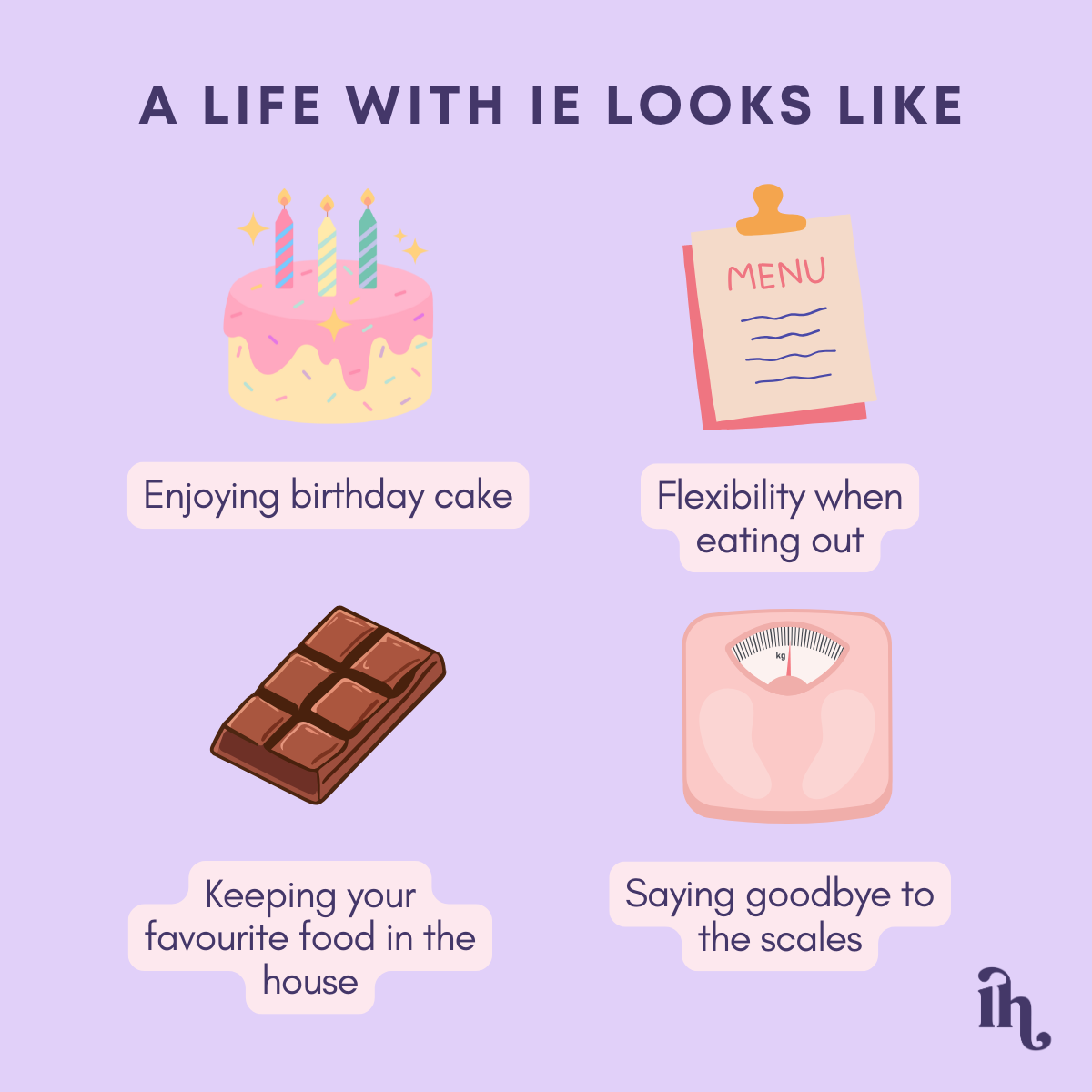
Depending on your personal situation, medical conditions and history, the principles of IE are able to be interpreted by all.
You may be able to fully embrace it, or work towards doing so through implementing principles in your daily life.
If it’s possible for you, fully embracing the approach can be life changing. It can set you on the path to a life where you eat to live, not live to eat. Where food is no longer the central narrative – it is just something you do, without shame or judgement.
If you aren’t quite sure where to start, the team at Imbodi are here to guide you. Here to help you say goodbye to fad diets, strict exercise routines and unrealistic body standards (12).
Reclaim the dieting narrative, and take control over your relationship with food and self. You are capable of becoming an intuitive eater, and although it may sound daunting and overwhelming – it is attainable.
In Summary – Can Intuitive Eating Work For Me?
Ultimately, intuitive eating is recognised by health practitioners globally as an effective approach.
It has proven benefits on emotional, psychological and physical health.
A life reclaimed from the grips of diet culture is possible, and each and every person is capable of this.
IE can lead you to a life where your mind has the ability to think about things. Things other than food, shape and weight. To think about things that fuel your social, nourish your mind and promote your happiness.
Throwing away the pursuit of weight loss, changing your mindset, can change your life.
Reach out to the team at Imbodi Health – begin the pathway to intuitive eating and a life of true freedom and reconnection.
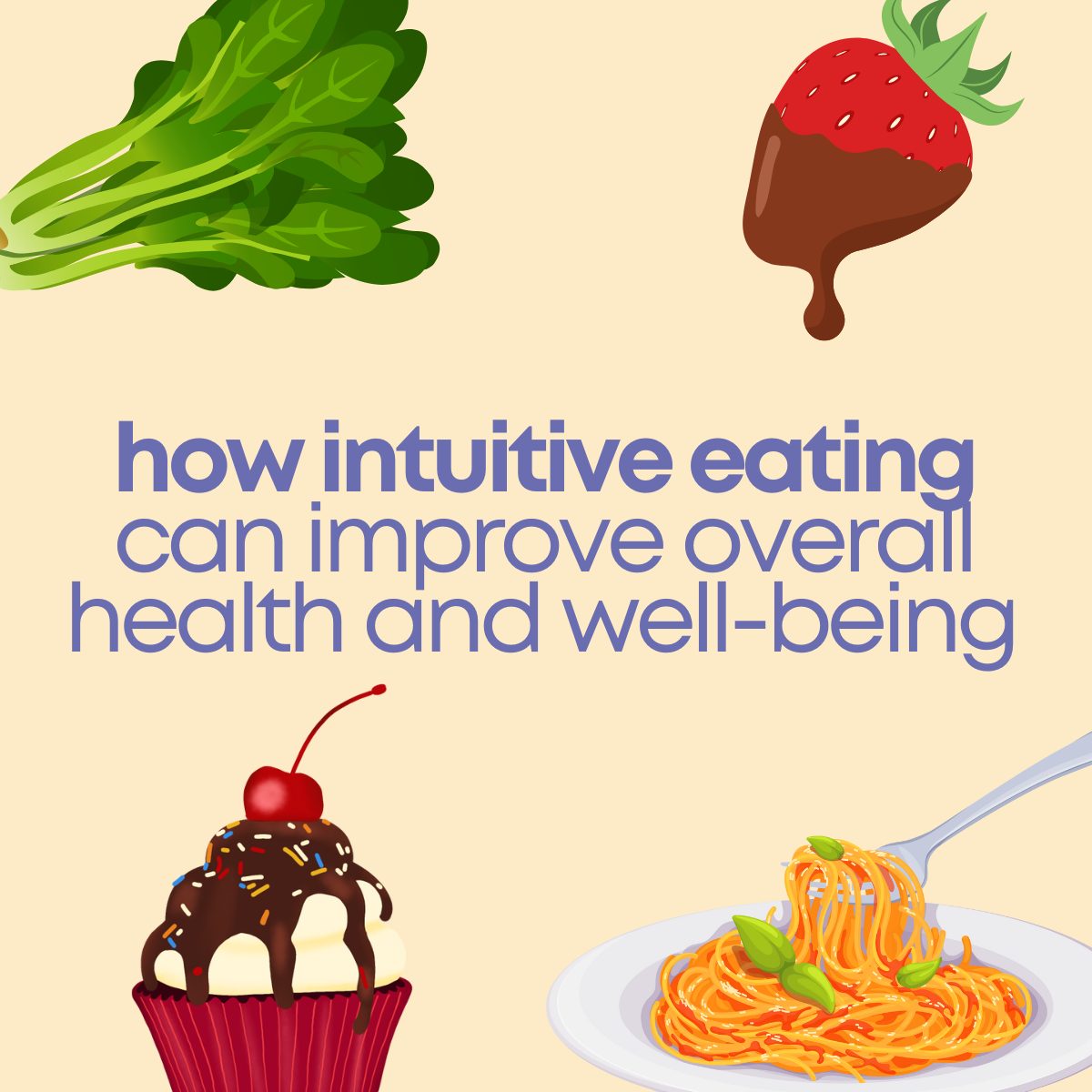
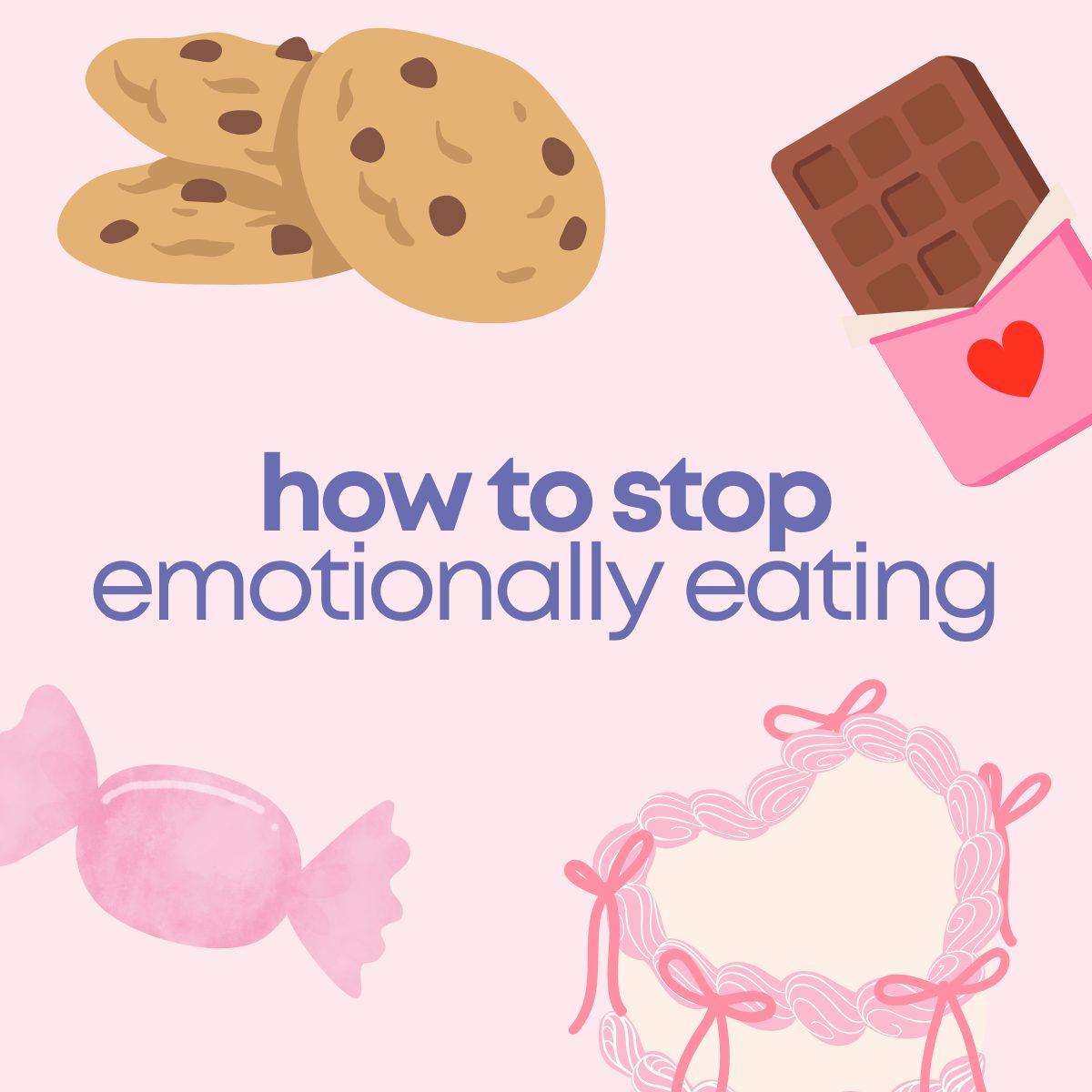
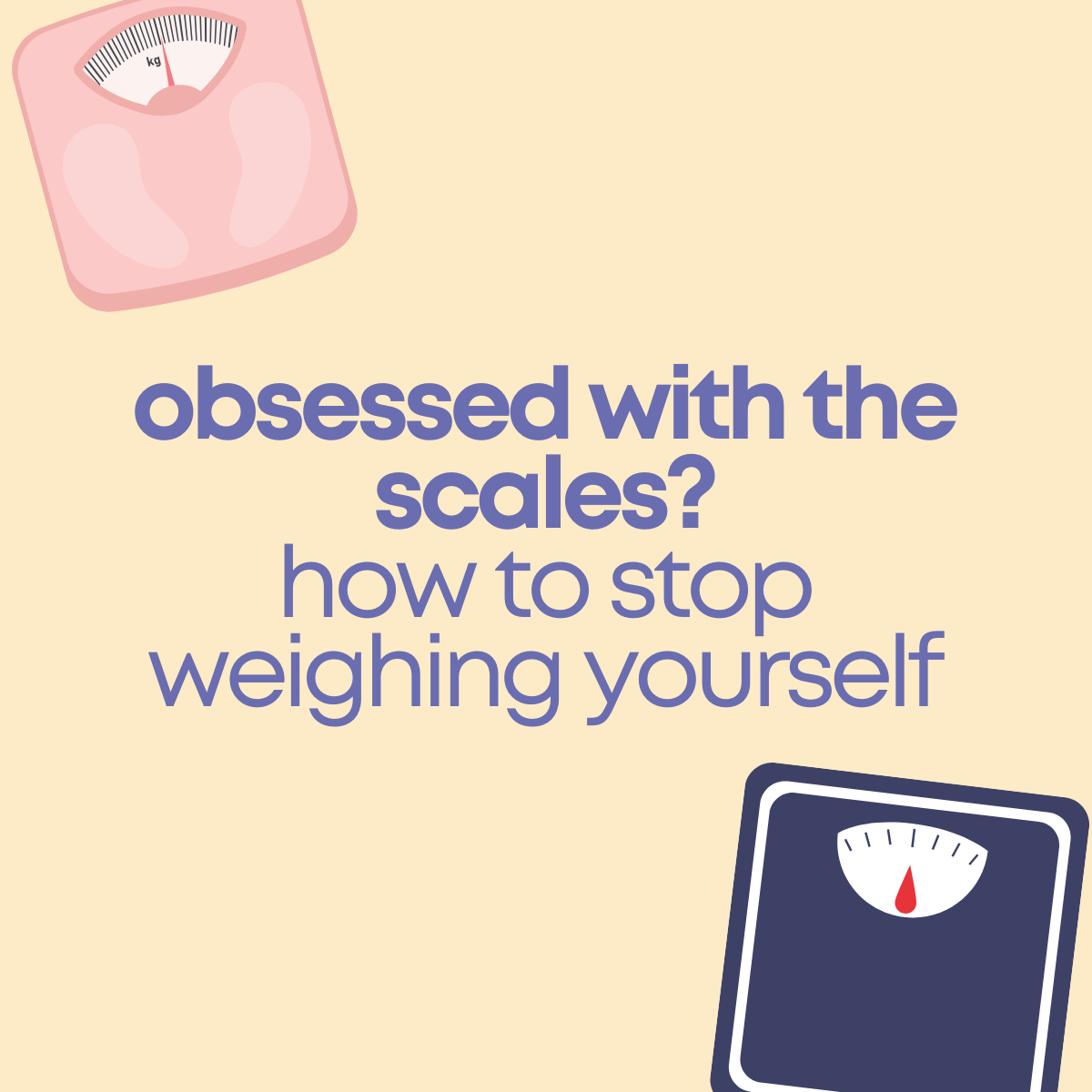

Comments +